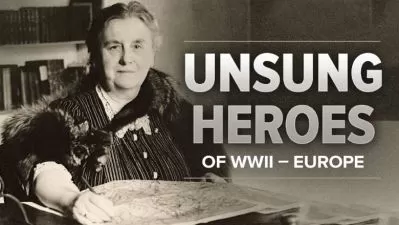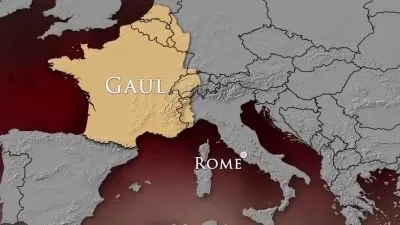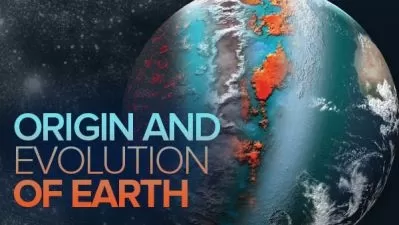The Big History of Civilizations
Craig G. Benjamin
17:54:55
Description
The history of human civilization is an astonishing story of migration, innovation, and social development. Over 200,000 years, humans have populated the planet, adapted to environmental challenges, experimented with systems of government, and left such a strong mark on the earth that scientists now refer to our era as the Anthropocene—the era of humanity.
Now, the exciting new field of Big History allows us to explore human civilizations in ways unavailable to historians of previous generations. Scholars of this multidisciplinary approach study great spans of time, unlocking important themes, trends, and developments from around the world that have occurred over millennia.
The Big History of Civilizations is your chance to apply this leading edge historical approach to the epic story of humanity around the world. Taught by acclaimed Professor Craig G. Benjamin of Grand Valley State University, these 36 sweeping lectures trace the story of human civilizations from our evolution as a species, through our major adaptations and revolutions, and into the future.
Unlike a traditional survey of history—with its focus on dates and events, kings and battles—Big History takes an expansive approach that allows you to:
- Ask the big questions about the rise of civilizations around the world, and lay out key similarities and differences among different civilizations.
- Consider the necessary conditions for modern civilizations to exist, from trade and media of exchange to ideas about religion and approaches to governance.
- Find out how the environment—including geography and climate—has driven human migration and population growth over the millennia.
- Examine the evolution and adaptations of our species to discover what makes humans unique in the animal kingdom.
- Draw from the work of anthropologists, biologists, geneticists, chemists, linguists, and more to gain deeper insights into human history.
It only takes a few minutes of one lecture for you to discover that Big History offers a distinctive vantage point from which to view the story of humanity. Its grand vision will give you powerful new insights into human civilization, and it offers a profound analysis of some of our biggest questions: What makes us human? Where did we come from? And where are we going? There are no easy answers, but The Big History of Civilizations frames them in a unique and captivating way.
What makes this course so fascinating is the way Professor Benjamin uses a comparative perspective and outlines the big-picture themes of human civilization. For instance, among other topics, you will:
- Apply the work of archaeologists and anthropologists to consider the evolution of Homo sapiens 200,000 years ago.
- See why the agricultural revolution may not have been the boon to humanity that traditional history narratives might suggest.
- Compare the development of civilizations in the world’s four geographic zones—Afro-Eurasia, the Americas, Australia, and the Pacific Islands—to see what broad lessons each region can tell us.
- Find out what cutting-edge DNA analysis can tell us about early experiments with agriculture.
- Reflect on the role of the climate in guiding human civilization, and explore how humans have adapted to changing climate patterns.
- Use the themes of Big History to peer into the near and distant future to consider what might be in store for humanity in the coming centuries and millennia.
A Bigger View of Big History
What makes the Big History approach so unique? Whereas a traditional survey might take you through the major events of a period and introduce you to key dates and people (the “kings and battles” approach), Big History zooms out to bring larger trends into focus, from the type of geography best suited for civilization to the way climate patterns drive human activity like the transition into agriculture.
One major trend you’ll uncover is that, regardless of time or place, civilizations require certain “Goldilocks factors” to succeed. At all scales—the cosmic, the planetary, the ecological, and the human—you can view moments where a combination of just-right ingredients creates the necessary conditions to cross the next threshold of complexity. A few such unique conditions that Professor Benjamin examines are:
- Climate changes during the Paleolithic Era
- The relationship between the agricultural revolution and human population growth
- The relationship between power and the rise of early city-states
- The spread of ideas along Silk Roads and other trade routes
- The Industrial Revolution and the development of consumer capitalism
- Peak oil, climate change, over-population, and other near-future scenarios
In addition to these global trends, Professor Benjamin also zeroes in on the many great civilizations across time and around the globe, including Mesopotamian cities and empires; ancient Egypt, Greece, and Rome; South Asian civilizations; Chinese dynasties; Mongols and other militarized nomadic tribes. You’ll also move beyond many of the cultures traditionally covered in survey courses to study North American native cultures, the Olmecs, the Aztecs, the Incas, and other cultures of Meso- and South America; little-studied civilizations in sub-Saharan Africa such as the Bantu and the Swahili kingdom; the golden age of the Islamic civilization; and myriad cultures across Australia and the Pacific islands. From Jericho to Mohenjo-Daro and from Egypt to New Zealand, this course takes you into every corner of the globe to give you a truly comprehensive understanding of humanity.
Take a Multidisciplinary Approach to History
What differentiates Big History from other historical perspectives is the way it combines divergent fields to give you a holistic view of human civilization, including:
- Geography: From rivers to mountain ranges, and bluffs to islands, explore the relationship between the natural landscape and civilization.
- Geology: Study the role of plate tectonics in forming habitable environments—and reflect on the difference between geologic time and human time.
- Anthropology: Discover the origins of our species and trace its development from early hominids to Homo sapiens.
- Genetics: Employ the latest techniques to analyze human, animal, and even plant DNA to learn about humanity’s impact on the environment.
- Linguistics: Find out why a shared language and collective learning are one of the primary markers for what makes us human.
- Economics: Unpack the impact of trade and exchange, and review big-picture ideas such as Malthusian cycles, global trade routes, and consumer capitalism.
Archaeology, history, science, philosophy, religion, ecology, botany—the list goes on and on. Big History ties these fields together, which allows you to take a step back and see patterns in the warp and weft of human civilization.
Stories with Large-Scale Impact
Consider this explanation for the origins of agriculture: foragers adopt a less nomadic lifestyle and begin to live in one spot. From there, population growth slows their ability to migrate while also increasing the need for food—a condition called the “trap of sedentism.” Ultimately, perhaps the only remaining survival strategy is the adoption of agriculture.
Does this story explain the entirety of the Agricultural Revolution? Of course not, but scientists and historians have seen accounts similar to this across different—and independent—geographic zones, suggesting a unifying pattern. Big History thrives on such accounts, and Professor Benjamin will leave you enraptured with this approach to history and human civilization.
What Makes Us Human
While the big-picture lens on human civilization is fascinating, ultimately it is a uniquely human story. Stories of the invention of agriculture, or Malthusian expansions and contractions, or the Industrial Revolution are only interesting insofar as they tell us where we have come from as a species—and therefore why we are the way we are.
You’ll journey around the world to meet a range of peoples, from the Bushmen of South Africa to the Longshan farmers of China. You’ll uncover the secrets of ancient cities such as Sumer, Uruk, Catul Hayuk. You’ll delve into cultures and explore innovations ranging from the invention of paper in China’s Han Dynasty to the expansion of railroads across the United States to the explosion of consumer capitalism in the technological age.
Step into the Future
This is the human story of our relationship to the planet, and at the end of the course Professor Benjamin devotes two special lectures to apply the methods of Big History to the future. Scientists, economists, philosophers, policy-makers, and everyday citizens alike will soon face extremely tough choices about energy production, population growth, innovation, and the human impact on the environment.
What lies in front of us? Will we continue to adapt as our forebears have been doing for thousands of years, or will we push our resources to the breaking point? Can we imagine life in the year 2100? 2600? 3100? Professor Benjamin gives you the tools to consider the possibilities and what will impact humanity in the future.
And these questions raise fundamental questions about human nature. Are we essentially driven by violence and greed to construct imperial societies based on a ruthless competition for power and treasure? Or are violence and greed only parts of human nature, tendencies tempered by instincts of cooperation, empathy, and self-sacrifice for the greater good?
The old adage says that those who fail to understand history are doomed to repeat it. The Big History of Civilizations offers a powerful—even necessary—way of understanding our history so that, with any luck, we will be able to make a better future for everyone.
More details
User Reviews
Rating
Craig G. Benjamin
Instructor's CoursesDr. Craig G. Benjamin is Associate Professor of History in the Frederik Meijer Honors College at Grand Valley State University (GVSU), where he teaches East Asian civilization, big history, ancient Central Asian history, and historiography. He earned his undergraduate education at The Australian National University in Canberra and Macquarie University in Sydney, and his Ph.D. in Ancient History from Macquarie University. Professor Benjamin has received several awards for teaching, including the 2012 Faculty of Distinction Award from Omicron Delta Kappa Society (a national leadership honor society) and the 2009 Student Award for Faculty Excellence from the GVSU Student Senate. He is the author of numerous articles and books, including The Yuezhi: Origin, Migration and the Conquest of Northern Bactria and Readings in the Historiography of World History. He is coauthor (with David Christian and Cynthia Stokes Brown) of Big History: Between Nothing and Everything. Professor Benjamin is an officer of the World History Association and the International Big History Association. He is also a consultant for The College Board and a member of the SAT World History Subject Committee and the Advanced Placement World History Development Committee.

The Great Courses
View courses The Great Courses- language english
- Training sessions 36
- duration 17:54:55
- English subtitles has
- Release Date 2023/06/07















